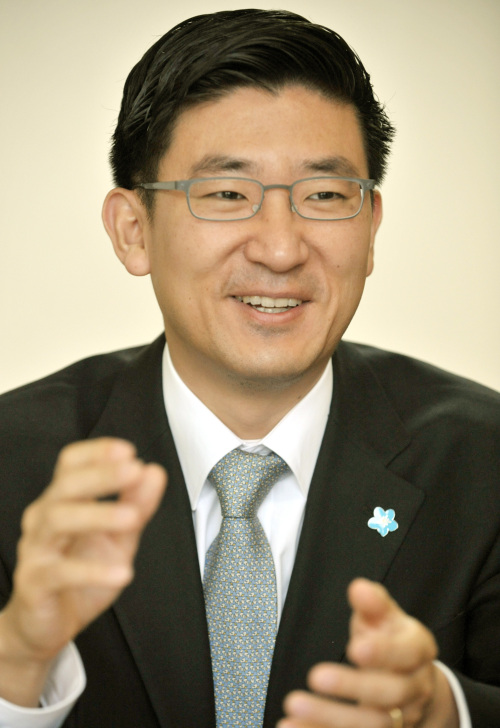This is the first of a series of interviews with first-term lawmakers. ― Ed.
The 18th National Assembly has been dominated by senior lawmakers, but rookies nevertheless managed to bring in some positive and significant changes, said a first-term lawmaker of the ruling Grand National Party said.
Rep. Kim Se-yeon, a Busan-based entrepreneur-turned-lawmaker and youngest member in the current parliament, is known for his active role in Minbon 21, an in-party group of progressive novice lawmakers.
He currently chairs the group jointly with Rep. Kim Sung-tae, a former labor activist.
“It is indeed tricky as a member of the ruling conservative party to speak for reform,” said Kim.
“Those who disapprove of the GNP would suspect our sincerity and traditional supporters may think that our (group’s) views stand against conservative values.”
The group has often clashed with the party’s leadership, especially when it spoke out against high-ranking members and the presidential office.
“No one likes to be criticized and judged, especially over political beliefs,” Kim said.
The reformative group’s goal, however, is not to counter the party’s fundamental policies, but to extend its political domain by embracing moderate-conservative voters, he explained.
Kim also said that the current assembly allowed little room to junior members and minority groups.
“The in-party nomination process back in 2008 was stained by factional strife and monopolization,” Kim said.
The 18th National Assembly has been dominated by senior lawmakers, but rookies nevertheless managed to bring in some positive and significant changes, said a first-term lawmaker of the ruling Grand National Party said.
Rep. Kim Se-yeon, a Busan-based entrepreneur-turned-lawmaker and youngest member in the current parliament, is known for his active role in Minbon 21, an in-party group of progressive novice lawmakers.
He currently chairs the group jointly with Rep. Kim Sung-tae, a former labor activist.
“It is indeed tricky as a member of the ruling conservative party to speak for reform,” said Kim.
“Those who disapprove of the GNP would suspect our sincerity and traditional supporters may think that our (group’s) views stand against conservative values.”
The group has often clashed with the party’s leadership, especially when it spoke out against high-ranking members and the presidential office.
“No one likes to be criticized and judged, especially over political beliefs,” Kim said.
The reformative group’s goal, however, is not to counter the party’s fundamental policies, but to extend its political domain by embracing moderate-conservative voters, he explained.
Kim also said that the current assembly allowed little room to junior members and minority groups.
“The in-party nomination process back in 2008 was stained by factional strife and monopolization,” Kim said.

“Under such influences, it would have been difficult for first-timers to speak out, especially when their thoughts did not stand in line with the party’s.”
The GNP, however, has recently made bold steps for change, he added.
“The election of Rep. Hwang Woo-yea as floor leader in May shed a ray of hope that the party may solve its years-long factional disputes,” Kim said.
Despite such optimism, the ruling party ran into obstacles in the latter half of the year, after the Seoul mayoral by-election defeat and the snap passage of the Korea-U.S. Free Trade Agreement.
“Minbon members tried until the very last minute to reach a peaceful conclusion,” he said, referring to his colleague Rep. Jeong Tae-keun, who staged a hunger strike against a GNP move to pass the bill through the National Assembly unilaterally.
“We are sorry that our efforts were not sufficient.”
Kim was also one of the 22 GNP lawmakers who pledged to give up their candidacy in the next general election should they involve themselves in violent clashes or scuffles with opposition lawmakers within the parliament.
But the party came to fully embrace renewal as the most pressing issue amid mounting criticism and falling support, the lawmaker said.
The party’s most recent turmoil involving the resignation of Supreme Council members was also inevitable, he said.
Kim, along with his Minbon colleagues, issued a statement on Thursday, demanding that the party launch an emergency committee to drive fundamental renewal and former chairwoman Rep. Park Geun-hye, the party’s presidential frontrunner, play a leading role.
He officially called for a reshuffle of the current leadership led by Rep. Hong Joon-pyo.
The lawmaker also stressed that it is not only the first-term lawmakers’ role to promote political reform.
“Regardless of the number of times they’ve been reelected, a lawmaker is to act upon his or her unchanging beliefs,” Kim said.
Besides his efforts for the party’s renewal, the lawmaker is devoted to reducing education discrimination based on income and to improving the academic environment for low-income and North Korean defector families.
The former businessman also supports the introduction of extra tax for the top-income bracket, an unexpected move for a former CEO whose wealth was ranked fourth among the current parliamentary members.
In a survey conducted earlier this year, the heir to a Busan-based rubber factory and son of a former senior lawmaker owned assets amounting to 82.6 billion won ($73 million).
“In order to achieve sustainable growth, it is crucial to prevent the imbalanced distribution of wealth,” he said.
The current assembly has been marked with many faults and is yet to undergo further changes in order to turn over a new leaf but the efforts will hopefully continue throughout the remaining few months of this term and into the next, Kim said.
By Bae Hyun-jung (tellme@heraldcorp.com)
-
Articles by Korea Herald





![[From the Scene] Monks, Buddhists hail return of remains of Buddhas](http://res.heraldm.com/phpwas/restmb_idxmake.php?idx=644&simg=/content/image/2024/04/19/20240419050617_0.jpg&u=20240419175937)




![[Graphic News] French bulldog most popular breed in US, Maltese most popular in Korea](http://res.heraldm.com/phpwas/restmb_idxmake.php?idx=644&simg=/content/image/2024/04/18/20240418050864_0.gif&u=)




![[From the Scene] Monks, Buddhists hail return of remains of Buddhas](http://res.heraldm.com/phpwas/restmb_idxmake.php?idx=652&simg=/content/image/2024/04/19/20240419050617_0.jpg&u=20240419175937)

![[KH Explains] Hyundai's full hybrid edge to pay off amid slow transition to pure EVs](http://res.heraldm.com/phpwas/restmb_idxmake.php?idx=652&simg=/content/image/2024/04/18/20240418050645_0.jpg&u=20240419100350)

![[Today’s K-pop] Illit drops debut single remix](http://res.heraldm.com/phpwas/restmb_idxmake.php?idx=642&simg=/content/image/2024/04/19/20240419050612_0.jpg&u=)